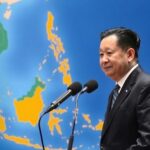China’s Reliance on Myanmar’s Military: A Strategic Misstep?
China’s economic and military growth elevates its global standing, but its support for Myanmar’s military junta could be misguided as resistance movements gain traction. As the junta’s power declines, aligning with the National Unity Government (NUG) could better serve China’s interests and foster stability in the region. This shift would also enhance China’s diplomatic reputation in Southeast Asia.
In recent years, China has transitioned from a regional power to a predominant global force, driven by a robust economic growth and military expansion. The 2023 US Department of Defense Report recognizes China as the sole competitor capable of influencing the international order. Central to China’s strategic ambitions is the Belt and Road Initiative (BRI), which facilitates enhanced global trade and infrastructure development. Among the BRI’s six economic corridors, the China-Myanmar Economic Corridor (CMEC) holds significant importance, connecting China’s Yunnan province with Myanmar’s strategic port at Kyaukphyu, thereby addressing the “Malacca Dilemma” by securing energy routes and resource flows vital for China’s economy.
Historically, China has balanced its influence in Myanmar by supporting both the Myanmar military (MM) and various ethnic resistance groups. Following the military coup in 2021, China’s initial stance was noncommittal, opting to observe the evolving political landscape. However, as civil unrest escalated and the People’s Defense Forces (PDFs) emerged, China shifted its support towards the junta, as evidenced by recent visits from Chinese officials to Myanmar’s military leadership. China’s actions have included pressuring ethnic armed organizations (EROs) along its borders to avoid alliances with the opposition National Unity Government (NUG) and deploying mercenaries to protect its investments.
Despite its attempts to secure its interests through the junta, China may be aligning itself with a diminishing power. The Myanmar military is increasingly unpopular among the populace, and resistance groups are gaining momentum in their fight for autonomy. Additionally, organizations such as the Arakan Army and Kachin Independence Army continue to assert control over territories, indicating the military’s waning authority. A critical mass of opposition groups seeks a federal democratic Myanmar, aligning with the NUG’s goals.
The NUG, which has openly committed to protecting Chinese investments, represents a more stable and supported alternative for China. An alliance with the NUG would not only stabilize the region but also enhance China’s reputation in the ASEAN community. Historically, the Myanmar military has displayed animosity towards China, complicating future engagements.
Given the current geopolitical climate, particularly with the potential return of a hawkish US administration, China must strategically recalibrate its position in Myanmar. Embracing the NUG, which commands greater legitimacy and popular support than the SAC, would allow China to better secure its long-term interests in the region while fostering goodwill among the Myanmar populace. This shift represents a unique opportunity for China to demonstrate its commitment to responsible global leadership, as echoed in its own proverb, “With great power comes great responsibility.”
The article discusses China’s involvement in Myanmar amid the country’s ongoing civil strife following a military coup in 2021. It outlines the context of China’s strategic interests in Myanmar through the Belt and Road Initiative (BRI) and emphasizes the significance of the China-Myanmar Economic Corridor (CMEC) for securing energy and resource routes. The article examines China’s shifting support from the junta towards ethnic armed organizations and the National Unity Government (NUG), whose legitimacy and growing domestic support present a more stable alternative for China amid the volatility of the Myanmar military regime.
China’s support for the Myanmar military regime may lead to future diplomatic setbacks as the military weakens and faces growing resistance from popular movements. The government’s unpopularity and economic hardships faced by citizens jeopardize China’s interests in the region. By re-aligning its strategy and endorsing the NUG, China has the chance to enhance its global reputation, promote stability in Myanmar, and secure its long-term BRI objectives. This recalibration emphasizes the necessity of aligning with legitimate governance to foster development and peace.
Original Source: asiatimes.com








Post Comment